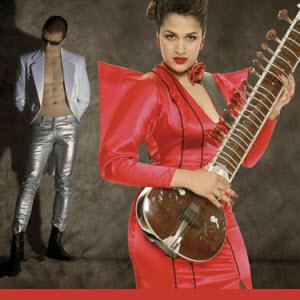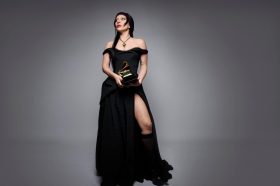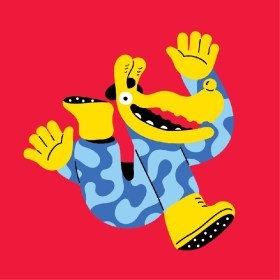Part I
Matt Stokes – Sacred Selections
With Ollie McGill & Rowan Vince
Shall We? was a one off concert for the Melbourne International Arts Festival, double billed with Matt Stokes’s Sacred Selections, part of Pipe Up: 400 Years of Organ. It’s something of a coup for the festival, as it was only the second time Cameron Carpenter and Bishi have created a concert together. The program promised “a performance by two of the world’s most original young talents who come together in musical harmony and mutual respect.”
On Monday night the Melbourne Town Hall Grand Organ seemed to positively beam from its three-storey height with the opportunity to show off its 7,849 pipes, collection of bells, snare and bass drums and glockenspiel and be really loud.
The mobile twin keyboard console had been moved to the centre of the stage and four rear projection screens set up to provide intimate close ups, feet flying over pedals, hands flashing across the keys, an aerial of the four keyboards and another set to capture the intense expressions of the players. No wonder it was excited.
If you’re an organ, even one of the best in the Southern hemisphere you don’t get out much, not when you’re around 20,000 tonnes, so you have to wait awhile for someone who really knows how to play you to comes around. This week, he did and he brought a friend.
Cameron Carpenter likes showing off his stuff too. He’s Mozart reborn but he likes to play organ. He came out on stage in diamante crusted black spandex pants, black tank top, cream leather shoes with more diamantes and an Adam Ant like blue stripe wrapped over his eyes. Peter Allen would be jealous. Carpenter’s bio describes him as an acknowledged child prodigy, home schooled in rural Pennsylvania who gave his first European debut as an organist shortly after leaving school at age 13. He got his bachelor’s and master’s degrees at The Julliard School in New York but he was never going to turn out like most conservatoriums think as a pipe organist should be. He has Grammy nominated solo albums for goodness sake, he made it big on YouTube, and he plays the organ likes he’s his own orchestra. He does things on it no one’s ever done before and golly, does it keep him fit or what! He’s completely unorthodox.
And so he started to play JS Bach, Fugue in G Major and my mouth drops. I mean like wow. I didn’t know the organ could be played like that.
His friend for the recital is Bishi, a woman who seems to counterpoint him in the most holistic way you can’t help wondering at destiny’s weirdness. She comes from a musical Bengali family, has sung since she was two, played piano since she was six, trained in both Western and Eastern classical music but is better known as an influential DJ in London’s club scene. A long beat after her introduction she comes on stage a little lost, missing a cord she leaves again while Cameron plays a Prelude. When she returns she’s ready to pick up her electric sitar, yes, sitar.
There’s a reincarnation in her too, but I’m not sure who. You have to try and imagine a fusion of Chaka Khan, Grace Jones and the voice of Julie Andrews with the wisdom of a mountain. She’s in a curvy satin red dress with devil horns on the shoulders, a swirly red spiral roll in her hair, red triangle earrings and gold shoes. Accompanied by the organ and playing her sitar she sings an Elizabethan folk tune, The Three Ravens, and it’s just beautiful. Her voice is like a song bird.
Their next piece Bishi explains isn’t on the program but comes from the energy Cameron Carpenter has to inspire complete randomness. They play Leonard Cohn’s Sisters of Mercy. Through the recital they play a sort of duelling ancient instruments piece of Raga and Bach, The Sherman Brothers ‘Feed the Birds’ from Mary Poppin’s and Bowie’s ‘The Man Who Sold the World’.
Carpenter describes to the audience their first meeting as being in a dilapidated church in Shoreditch, London run by one of only three rock n roll priests in the UK. Funny how two can be so much more than two ones. Through a friend’s suggestion Bishi had asked Carpenter to play on her album Albion Voice, but the combination of their music like stars colliding seems to burst forth new elements, unimagined and unexpected, like a nuclear furnace and it fascinates them as much as their audiences.
Which isn’t to say it’s all easy listening. Carpenter as he introduced The King, another ancient folk song he has transcribed to the organ, explained his interest is in finding the outside voice, the unschooled. It’s more interesting. But that doesn’t mean every experiment works. The organ is challenging. Most of us only hear it down the aisle and at our grannies funeral. It was hard to shake the preconceptions, or to get your ears around the way it was being made to morph simple tunes into complex sounds. Sometimes it was gorgeous, sometimes elevator music; it thumped and stomped and tinkled cute little bells. I was fascinated and watching the people around me they all seem riveted too. This was riding on the cultural edge.
Part II
Cameron Carpenter & Bishi – Shall We?
How Cameron and Bishi will influence each other’s future work, what they will create and how it will lead others to blend the music and ideas of history, culture, and place into some sort of visva sound, I’ve no idea. However, Sacred Selections, which preceded Shall We? demonstrated what else is emerging from this intriguing milieu of experimentation with the organ.
Artist Matt Stokes has taken to delving into underground subcultures and their music for his collaborative works. First performed in 2005, Sacred Selections takes songs of great meaning and significance in this case to the musical subculture fans of Northern Soul, Happy Hardcore and Black Metal, and transcribes them to the organ, playing upon the organ’s traditional association with sacred music. Added to the repertoire for the evening was an Australiana component of songs transcribed and performed by Ollie McGill.
The first three iconic Northern Soul pieces, Yvonne Bakers 1967 You Didn’t Say A Word for example, were played by Melbourne musician Rowan Vince and composer and educator Tim McKenry. Sitting side by side, two rows of keyboards each, Rowan can’t seem to wipe the smile from his face while Tim plays with excited concentration. At times I’ve no idea what’s going on but they seem pretty pleased with it.
Those sixties soul sounds were all stirred around sometimes cool and chatty, sometimes going deep and gutsy. It felt a lot like the Spicks and Specks segment, Look what they’ve done to my song though, and I really wished I’d brought Alan Brough with me.
Rowan Vince then played three Happy Hardcore pieces, Shooting Star by Bang, Midnight Express by Hopscotch and Stay with Me by Sy & Demo and a Black Metal piece, Dusk and her Embrace by Cradle of Filth. To the untrained ear, that is mine, it’s largely a cacophony with amusing deviations but that’s perhaps as much the case with the original music. Occasionally there are recognisable passages. Sometimes the music is rolling around with such force it’s like auditory drowning, being thrown around in a rip of noise. Vince finishes with arms laid out across the keyboard, head down in collapse, which gets a whoop and cheer from the audience.
Ollie McGill better known as the keyboardist with The Cat Empire had selected three Australian rock classics to transcribe for the organ, Under the Milky Way by the Church, Barnie’s Working Class Man and Farnsie’s You’re the Voice. As the flag wave to local content however, he managed to take simple well-loved tunes and roll over them with 20,000 tonnes of pipe work. Unfortunately proving that not every tune can stand up to that kind of treatment.
Ollie’s expressions writ large on the screen looked agonized, which for You’re the Voice I can understand, but I don’t think childbirth looks so painful and I feared he needed an epidural to control his Ray Charles like swaying. He also seemed to insert every scale he knew into the middle of Farnsie’s classic for no other reason than to show his digital propulsion, Then as he reached the climactic end, the volume levels grew so loud I saw numerous people holding their fingers in their ears. Perhaps pub crawl songs are just too sacred.
Melbourne International Arts Festival
9 – 24 October
The City of Melbourne holds a series of free lunch concerts and other events throughout the year, and thanks to a backstage viewing platform, tours of the building allow visitors to see the inner workings of the organ.
To join a mailing list for performances on the Melbourne Town Hall Grand Organ, phone (03) 9658 9658 or visit www.thatsmelbourne.com.au/grandorgan or for Town Hall tours see the What’s On section of the That’s Melbourne website.




